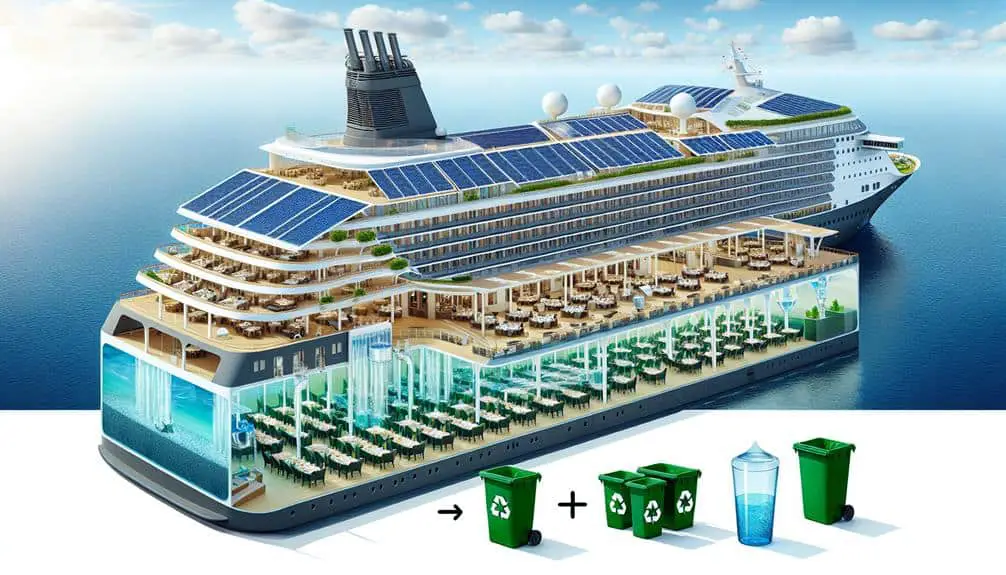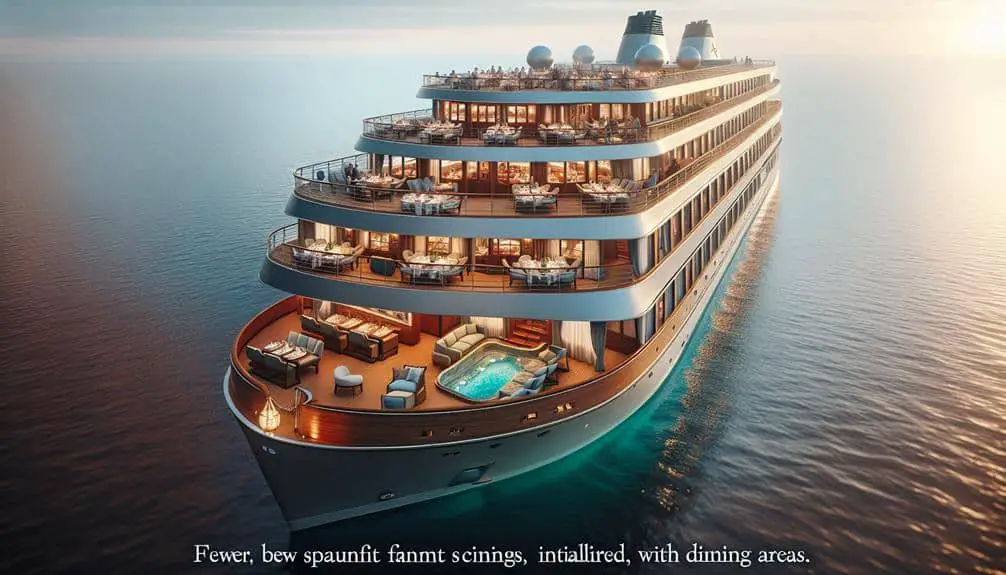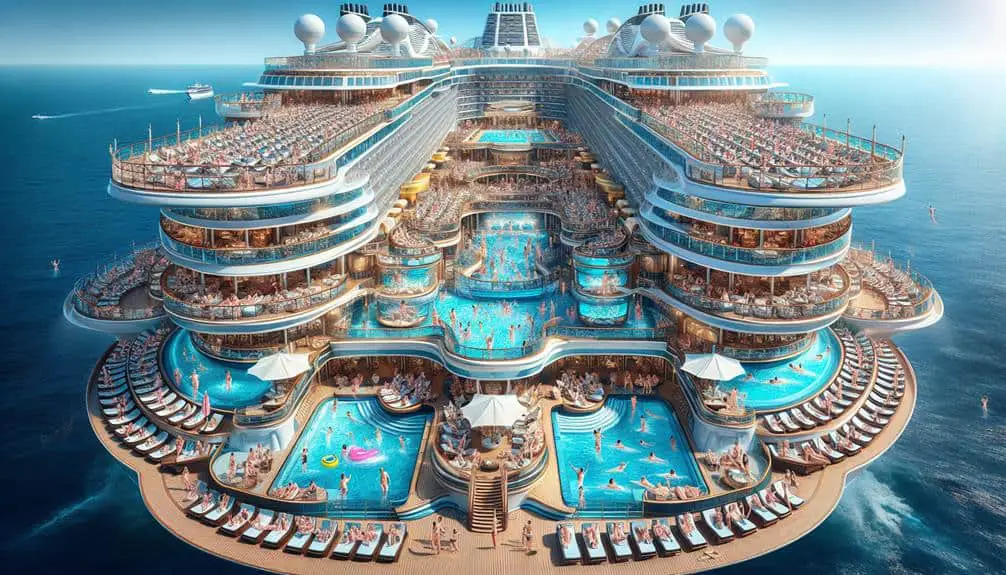When considering eco-friendly initiatives on large cruise vessels, you should focus on Energy-Efficient Lighting Systems, Waste Management and Recycling Programs, and Advanced Water Treatment Technologies. LED lighting systems substantially reduce power usage by up to 80%, decreasing the environmental impact while providing superior quality lighting for passengers. Effective waste management through advanced recycling programs guarantees waste reduction, proper sorting, and resource recovery. Advanced water treatment technologies are also vital, utilizing cutting-edge filtration systems to conserve water, enhance purity, and minimize freshwater intake and wastewater discharge. These three initiatives showcase a strong commitment to sustainability onboard large cruise vessels.
Key Points
- Energy-efficient lighting systems reduce power consumption and provide better quality lighting for passengers.
- Waste management and recycling programs minimize environmental impact and recover valuable resources through advanced technologies.
- Advanced water treatment technologies conserve water, ensure purity, and showcase a commitment to sustainability on large cruise vessels.
Energy-Efficient Lighting Systems
Implementing energy-efficient lighting systems on cruise vessels greatly reduces power consumption and environmental impact while enhancing overall sustainability efforts. By utilizing sustainable materials in the construction of these lighting systems, cruise lines can drastically decrease their carbon footprint. LED lighting, for example, consumes up to 80% less energy than traditional incandescent bulbs, leading to substantial energy savings.
These energy-efficient systems not only benefit the environment but also enhance the onboard experience for passengers by providing better quality lighting while reducing heat emissions. Additionally, the longevity of LED bulbs means reduced maintenance costs and fewer replacements, further contributing to sustainability goals.
Incorporating sensors and automation in lighting controls also maximizes energy efficiency by adjusting light levels based on natural light availability and occupancy, ensuring the most efficient energy use. Overall, the adoption of energy-efficient lighting systems represents an essential step towards creating more environmentally friendly cruise operations.
Waste Management and Recycling Programs
To optimize sustainability efforts onboard cruise vessels, addressing waste management and implementing effective recycling programs is paramount. Waste reduction strategies play an essential role in minimizing the environmental impact of large cruise ships. By segregating waste streams onboard and encouraging passengers and crew to participate in recycling programs, notable progress can be made towards sustainable disposal methods. Implementing thorough waste management plans that focus on reduction, reuse, and recycling not only helps in reducing the volume of waste generated but also promotes a culture of environmental responsibility among all stakeholders.
Cruise lines are increasingly investing in advanced waste separation technologies to make sure that materials like plastics, glass, paper, and organic waste are properly sorted and processed. These initiatives not only contribute to reducing the amount of waste sent to landfills but also enable the recovery of valuable resources through recycling. Additionally, some cruise ships are exploring innovative ways to repurpose waste materials onboard, further enhancing their waste management and recycling capabilities. By continually improving waste management practices and embracing sustainable disposal methods, cruise vessels can greatly enhance their environmental performance and contribute to a cleaner, greener future for the oceans.
Advanced Water Treatment Technologies
Utilizing state-of-the-art water treatment technologies is essential for enhancing sustainability practices on cruise vessels. Water conservation strategies play a pivotal role in the implementation of eco-friendly initiatives. Advanced filtration systems like reverse osmosis and ultraviolet disinfection are at the forefront of ensuring water purity onboard. Reverse osmosis technology effectively removes impurities, bacteria, and viruses from seawater, providing a sustainable source of clean water for various shipboard operations. Ultraviolet disinfection complements this process by efficiently eliminating any remaining microorganisms, further enhancing water quality standards.
Innovative filtration systems not only contribute to environmental protection but also reduce the overall water consumption on cruise vessels. By treating and reusing water through these advanced technologies, ships can effectively minimize their freshwater intake and wastewater discharge. This not only conserves natural resources but also aligns with regulatory requirements for marine pollution prevention. Implementing such cutting-edge water treatment solutions showcases a commitment to sustainability while ensuring a responsible approach to water management in the maritime industry.
Frequently Asked Questions
How Do Large Cruise Vessels Reduce Their Carbon Footprint While at Sea?
To reduce their carbon footprint while at sea, large cruise vessels implement energy-efficient technologies and sustainability practices. By utilizing renewable energy sources and emissions reduction strategies, they endeavor to minimize environmental impact and promote sustainable cruising experiences.
What Measures Are in Place to Ensure the Proper Disposal of Hazardous Waste on Cruise Ships?
To guarantee proper disposal of hazardous waste on cruise ships, waste management and recycling practices are strictly enforced. Adherence to hazardous waste disposal regulations is monitored to safeguard the environment. These measures uphold responsible environmental stewardship.
Are There Any Initiatives in Place to Reduce Air Pollution From Cruise Ship Engines?
Harnessing the power of innovation, cruise lines are integrating alternative fuels and green technology to reduce air pollution from engines. Emissions reductions and sustainability efforts drive these initiatives, showcasing a commitment to environmental stewardship.
How Do Cruise Ships Manage Their Food Waste to Minimize Environmental Impact?
To manage food waste, cruise ships implement food recycling and composting initiatives. They also use eco-friendly packaging solutions. These measures help minimize the environmental impact of food disposal and promote sustainable practices on board.
Are There Any Regulations in Place to Ensure Cruise Ships Use Environmentally-Friendly Cleaning Products?
To guarantee regulations compliance, cruise ships must use environmentally-friendly cleaning products. Sustainable practices like this help minimize the impact on marine ecosystems. Research indicates strict adherence to eco-friendly guidelines benefits the environment and promotes responsible tourism.




